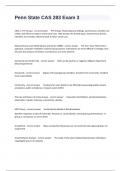Penn State CAS 283 Exam 3
CMC vs. FTF Groups - correct answer FTF Groups: Shared physical settings, synchronous, members are
visible, and influence leads to many social cues. CMC Groups: No shared space, asynchronous (more),
members are invisible, influence leads to fewer social cues.
Reduced Social Cues Model Sprout and Kiesler (1986) - correct answer Fits into "Cues Filtered Out"
approach, computer mediation is bad for group process, interactions are more difficult to manage, task-
focused, less pressure to behave, and decisions are more extreme.
Anonymity and Conformity - correct answer Both can be positive or negative, Milgram Experiment
(Shock Experiment)
Anonymity - correct answer Degree of knowing group members, freedom from constraints, freedom
from responsibility.
Conformity - correct answer Tendency for one's beliefs to be affected by prevailing beliefs, private
acceptance, public compliance, trying to avoid conflict.
The Ups and Downs of online Groups - correct answer Downside: Disinhibition, deindividualization,
polarization. Upside: Cohesion, interactivity, identity.
SIDE Theory - correct answer Social Identity Model of Deindividuation
Specifies responses to lack of nonverbal. Personal vs. social identity- minimal group phenomenon. In-
group vs. Out-group- us versus them
Groupthink - correct answer Ideas accepted by the groups are not examined and opposing ideas are
suppressed
Social Network Analysis - correct answer The study of the social relationships between individuals,
mapping/structure of networks
, 3 Defining Qualities of Social Networking Sites - correct answer Profile pages, links, ability to post or
leave other people messages
Men and Women on Facebook - correct answer Mostly reveal the same info
Facebook Use and Well-being of College Students - correct answer More Facebook equals lower self-
esteem, 1st year student: negative relationship between number of FB friends and adjustment,
Upperclassmen: positive relationship between number of FB, friends and adjustment and attachment to
university, number of friends is more telling than time
Facebook and Relationships - correct answer When relationships start, "happy couple" posts, when
relationships end
Facebook and Regret - correct answer Types of posts we regret- sensitive topics
Why we regret- unintended audiences, unintended consequences, "oops" moments, different from "real
world"
Offline- regret what we don't say
Online- regret what we say
Being Insufferable on FB - correct answer What makes a good FB post? An annoying one?
Annoying Posts - correct answer The Brag, The Undercover Brag, The I'm in a Great Relationship Brag,
The Cryptic Cliffhanger, The Literal Status Update, The Inexplicable-Public Private Message, The Out-of-
Nowhere Oscar Acceptance Speech, The Incredibly Obvious Opinion, The Step Toward Enlightenment
Changes in Technology - correct answer Changes in personal v. private, increasing relational
openness, more real-time information
Relationships Online - correct answer Richness- how much nonverbal is involved in a relationship,
presence- the feeling that you are actually with the person, competence- people that are highly
competent a lot of information is available to them




